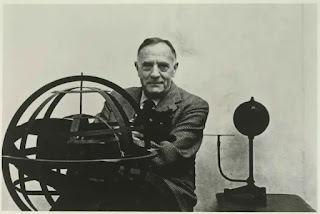Edwin Hubble: The Man Who Expanded Our Universe
Edwin Hubble, born on November 20, 1889, was a pivotal figure in astronomy
whose work revolutionized our understanding of the universe.
Hubble began his academic journey studying mathematics and astronomy at the University of Chicago. He then earned a Rhodes Scholarship to Oxford, where he studied law, a decision influenced by his father's desire. However, Hubble returned to astronomy after his father's death and earned his Ph.D. from the University of Chicago in 1917.
Hubble's early work at the Mount Wilson Observatory in California led to two significant discoveries. First, in 1923, he observed the Andromeda Nebula. Through his observations, Hubble determined that Andromeda was far beyond our own galaxy, thus proving that the Milky Way was not the only galaxy in the universe. This was a monumental shift in astronomical thought.
His most significant achievement came with formulating Hubble's Law in 1929. He discovered that galaxies are moving away from us at speeds proportional to their distance. This was the foundational observation for the expanding universe theory, which forms the basis of the Big Bang theory.
Hubble was known for his meticulous work and somewhat flamboyant personality, especially when dealing with the public and the press. He served in World War I and later re-enlisted during World War II, contributing to the war effort using his expertise in ballistics.
In the field of astrophysics, Hubble is remembered as a trailblazer. His discoveries fundamentally altered the scientific view of the universe. He laid the groundwork for future cosmological theories and research by proving that the universe was expanding.
To the general public, Hubble is often remembered through the Hubble Space Telescope, named in his honor. This telescope, launched in 1990, has provided some of the most detailed images of distant galaxies, further cementing Hubble's legacy in expanding our understanding of the cosmos.
Hubble's work profoundly impacted astrophysics, shifting it from a phase of collecting data to a more dynamic understanding of the universe's evolution. His discoveries opened the door to modern cosmology and have influenced countless subsequent studies in the field.
In society, his findings have played a key role in shaping our perception of our place in the universe. The realization that our galaxy is just one among billions challenged human perspectives, igniting scientific curiosity and philosophical contemplation about the universe and our role in it.
Edwin Hubble's journey from studying law to revolutionizing astronomy is a testament to the power of following one's passion. His discoveries and their impact on astrophysics have made him one of the most important astronomers of the 20th century, and his legacy continues to inspire astronomers and the public alike.



Comments
Post a Comment